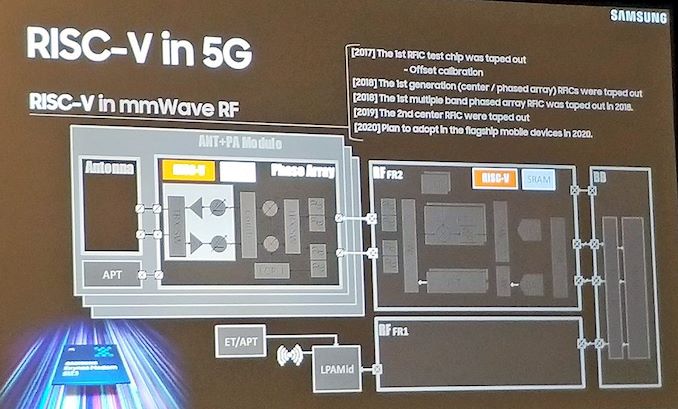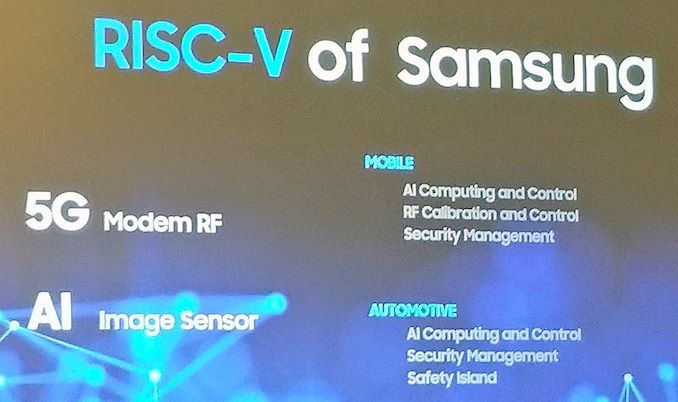Samsung to Use SiFive RISC-V Cores for SoCs, Automotive, 5G Applications
by Anton Shilov on December 12, 2019 11:00 AM EST
At the annual RISC-V Summit this week, Samsung disclosed the use SiFive’s RISC-V cores for upcoming chips for a variety of applications. The company is joining a growing list of leading high-tech companies that have adopted the RISC-V architecture.
One of the applications that Samsung is using RISC-V cores in is mmWave RF processing by its upcoming 5G RF front-end modules. The latter will be used for Samsung’s flagship 5G smartphones due in 2020. The RISC-V cores will also be used for AI image sensors, security management, AI computing & control.
It is noteworthy that Samsung taped out its first chip with a RISC-V core(s) as early as in 2017, so it started to work on it even earlier. In three years, Samsung has iterated on its designs and is now planning to adopt RISC-V cores for commercial applications, starting from mmWave RF processing in mobiles and expanding beyond them.
Besides the announcement of the RISC-V core integration, it's also Samsung's first instance of them talking about their mmWave modules in public. Unlike Qualcomm, Samsung tends to remain quiet about their developments until it's nearing commercialisation, and even then in a lot of cases we don't know too much about their designs. Nevertheless, it looks like the company has had mmWave designs for some time.
Samsung will be the fourth major company that has publicly disclosed its plans to adopt the open-source RISC-V architecture after Western Digital, NVIDIA, and Qualcomm. Western Digital intends to use the technology for a variety of applications, including SSD and HDD controllers. NVIDIA reportedly plans to use it for GPU memory controllers, whereas Qualcomm is set to use RISC-V for mobile SoCs.
All of the said companies have historically used processing cores based on architectures developed by Arm, and will likely continue to use them in the foreseeable future alongside RISC-V implementations. The advantage of RISC-V and the rationale for the vendors like Samsung choosing SiFive designs over Arm designs might be financial, as the former is likely undercutting its big competitor in price. For vendors doing their own microarchitecture designs, such as WD, RISC-V comes with no royalties attached, and offered more flexibility for vendors in terms of implementation. Arm only recently changed course in allowing vendor to implement their own custom instructions to the Cortex designs and architecture. Custom instructions developed by SoC vendors might be a huge benefit for efficient handling of ECC and RF processing among other things.
Related Reading:
- SiFive Announces First RISC-V OoO CPU Core: The U8-Series Processor IP
- Western Digital’s RISC-V "SweRV" Core Design Released For Free
- Western Digital Reveals SweRV RISC-V Core, Cache Coherency over Ethernet Initiative
- Western Digital to Use RISC-V for Controllers, Processors, Purpose-Built Platforms
Sources: The Register, Chris Williams/Twitter












18 Comments
View All Comments
Fataliity - Thursday, December 12, 2019 - link
Didn't Softbank buy ARM? They are taking a hit lately by A LOT of different companies. Wework, Wag, whatever else... Now their ARM business is going to face alot of competition in a few years due to their royalties and whatnot...And Intel and Apple gangbustered their IP sueing leg of the business by taking them to court, possibly cutting off that revenue stream too...
Seems like all tech companies are gunning for them after they destroyed the startup valuations by overbidding massively. Good for them.
bji - Thursday, December 12, 2019 - link
Yes Softbank bought ARM. I owned ARM stock at the time, and had to take the payout. I would have rather kept the stock, but that was not an option because it went private.Morawka - Thursday, December 12, 2019 - link
Let me ask you something if you don't mind. What do you mean by "they destroyed the startup valuations by overbidding"? Are you saying that ARM priced their ISA too high for startups to flourish? or something else. I'm genuinely curious as to what ARM has done in the market to cause the big chip makers to all invest in RISCV.DanNeely - Thursday, December 12, 2019 - link
They is Softbank not Arm.They created an ~$100bn fund (Vision Fund) to invest in startups and bid prices of various private companies crazy high resulting in massive hype that deflated when they went public (Uber, Lyft) or tried to (weWork).
They're trying to spin up a second equally vast fund as well (Vision Fund 2); but are struggling to find enough both enough investors with billions to blow to fund it and remaining unicorns to blow investors cash on. /worlds smallest violin
FunBunny2 - Thursday, December 12, 2019 - link
"/worlds smallest violin"yeah, but it beats, in an expected present value sense, buying Treasuries!!
rahvin - Friday, December 13, 2019 - link
Doubtful, they've lost an amazing amount of money on WeWork, that investment alone probably put them negative for years to come. Softbank alone has sunk $10.65Billion into WeWork, they've already written off $4.7Billion and will likely write the rest off at some point in the future.And the funniest bit is they paid off the wework CEO with $1.7Billion more to walk away. IMO the WeWork investment will never see a profit and I exect they'll write off the whole investment at some point in the future. That entire business isn't worth $500Million let alone the $47Billion that's been invested in it. The only way they could ever recoup that $500Million would be to slash spending and reduce the business to a profitable position but at the rate WeWork is burning cash they are bankrupt in about a year.
FunBunny2 - Friday, December 13, 2019 - link
"Doubtful, they've lost an amazing amount of money on WeWork, that investment alone probably put them negative for years to come."true. today. in hindsight. but interest rates, on various fiduciaries, have been sub-2% for ages. so, at those times, the discounted present value, risk adjusted, was way, way more than Treasuries. of course, setting the risk premium requires business smarts, not stat models. SB doesn't always (perhaps, only rarely) do well at that task. separate point from assuming that a big-bucks holder can turn a turd into a Unicorn just by throwing money at it. investing in a better mouse trap, early on, means that you've actually identified a better mouse trap. WeWork, in particular, bought space long and high and sold short and cheap. why anyone with a functioning brain would consider this a Unicorn play just proves that being rich doesn't mean you've been smart. same with Uber/Lyft: a business model which 'disrupts' one of the least lucrative businesses on the face of the planet isn't a Unicorn. well except for what gets stuffed up the butt of an investor.
FunBunny2 - Friday, December 13, 2019 - link
oh, yeah. The Taxi King in NYC has recently been taken to court for, in essence, blowing up the price of taxi medallions, of which he held many, many. IOW, he created the illusion that taxis were profitable, at least for medallion holders. turns out it was all vapor. could the Uber/Lyft folks be hoodwinked by their own cleverness."A Russian immigrant and a cabdriver’s son who got his nickname by building the city’s biggest fleet, Mr. Freidman was a primary architect of some of the tactics used to build the bubble, according to records and interviews."
here: https://www.nytimes.com/2019/12/05/nyregion/nyc-ta...
Yet again, naive Americans get taken to the cleaners by Russians. Who knew?